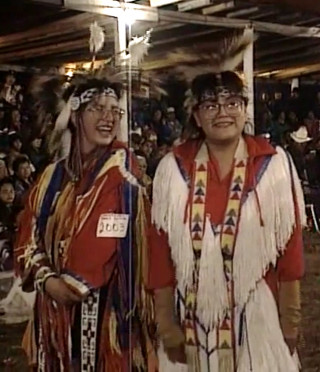
SYNOPSIS
SONG JOURNEY was funded by the Independent Television Service (ITVS) with funds provided by the Corporation for Public Broadcasting.
SCREENING HIGHLIGHTS AND AWARDS
- Two Rivers Native Film and Video Festival
- Taos Talking Picture Festival. Taos, New Mexico
ABOUT FILMMAKER(S)
Arlene Bowman is a Dine (Navajo) filmmaker and producer from Phoenix, Arizona. She completed her master's degree in film at the University of California at Los Angeles. Her most recent project is a mini digital video titled THE GRAFFITI, a 30-minute color experimental drama.
Arlene Bowman’s filmography is mainly composed of documentaries such as the award-winning NAVAJO TALKING PICTURE(1986) about herself and her shima sani Ann Ruth Biah; and SONG JOURNEY (1994), a documentary about Pow Wow women singers who sing songs in a traditional and not so traditional style. However, WOMEN AND MEN ARE GOOD DANCERS (1994), a Pow Wow dance-music video, as well as several video poems (1998 & 2000) represent the break from making documentaries. Although Arlene has produced mostly documentary films, she does not consider herself to be a conventional documentary filmmaker. Since the mid-80s, Arlene aspired to make a drama and THE GRAFFITI represents this first effort.
In the last five years, she has begun to perform songs at the open mic, both solo and with her partner. However, this new performance work did not develop overnight, it started during 1977 in Los Angeles with two guitarists, Terry Sullivan and Chuck Bauser from Seattle, who played rock and roll and delta blues music. Also within the last five years, she has begun to write and sing her own songs. Her first completed song called "Southern Dreamin" was included in THE GRAFFITI soundtrack.
Presently, Arlene considers herself to be a filmmaker/still photographer who performs, sings songs and recites poetry she has written. The photographs she shoots appear in her blog. In the future, she aspires to create a conference for Indigenous women filmmakers and a nonprofit organization for Indigenous and low-come filmmakers in the United States. (8/14)
Jeanine Moret received a master's degree in film production from the University of California at Los Angeles. She produced, shot, and edited "Banderani" (1987), filmed in a remote Andean village in Bolivia, South America, and was videographer for "Ancient Songs for a Modern World" (1992) and "Let the Children Speak" (1992, Santa Monica Television). In 1986 Moret was location manager and assistant to the producer on "Powaqqatsi", coordinating filming over six months in South America, Africa, the Middle East, Europe, and Asia. Currently Moret is working freelance as a documentary cinematographer/videographer and is developing a script on traditional Andean folkloric music. (09/09)
